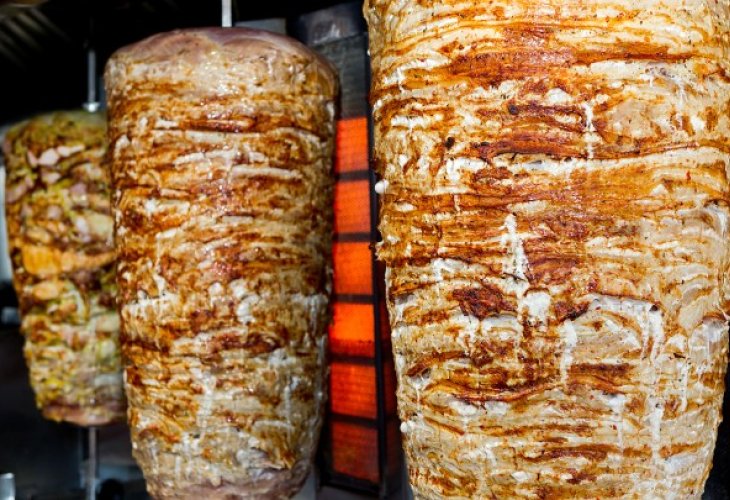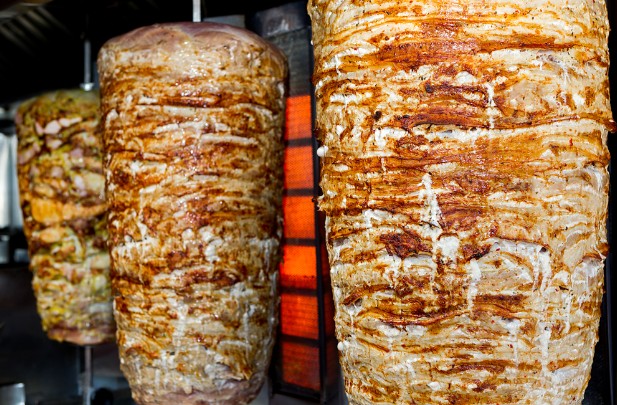Where is it Permissible to Buy Shawarma: Which Restaurants Have Concerns of Bishul Akum?
Crafting the perfect shawarma experience while navigating kosher considerations

Is it true that there is a problem of bishul akum (food cooked by non-Jews) in shawarma rotisseries sold in restaurants?
Before I detail the answer from both halachic and practical perspectives, it should be known that this answer primarily applies to Sephardic Jews who follow the rulings of the Shulchan Aruch. And it's unnecessary to mention that we're discussing establishments with high-level kosher certification.
There are places where a non-Jew stands to serve customers, and he cuts portions from the shawarma roasting in the machine, and by cutting the meat, the inner layer is exposed – which then roasts by the fire located there. Since the shawarma meat mounted on the spit reaches a thickness of thirty or thirty-five centimeters in diameter, and the fire doesn't cook all the meat when the spit is placed in the machine but only the outer layer – it follows that when the non-Jew cuts the outer meat and exposes the inner meat, he brings it to a state of cooking that wouldn't have occurred from the initial placement of the meat spit by the Jew.
Source of the law in the Shulchan Aruch and among the poskim: The Shulchan Aruch (Yoreh De'ah 113:7) writes: "The ignition of the oven is not effective... only the placement. Therefore, one who wants to cook in a pan in a non-Jew's oven must have a Jew place the pan in the oven, in a place suitable for cooking" (unlike the Rema's opinion, who holds that a simple acknowledgment such as lighting the fire or throwing a splinter is sufficient).

It is explained that according to the Shulchan Aruch, the placement of the food must be done by a Jew, meaning every placement of food must be done by a Jew. Therefore, when frying foods in oil, each food item constitutes a new placement, and a Jew must place the food items in the oil. This is also implied in the responsa 'Rav Pe'alim' by Rabbeinu the Ben Ish Chai (Yoreh De'ah Part 3, 69) that even though a Jew placed the pan on the fire and heated the oil, and the foods cook in the oil heated by the Jew, nevertheless the foods are not permitted if a non-Jew placed them in the oil.
The same applies if the Jew placed the food and the oil is not deep. If the food needs to be turned in the oil to cook on the other side, the turning must be done by the Jew, because if a non-Jew turns the food, the cooking done on the other side would be solely by a non-Jew and the food would be forbidden due to bishul akum (from the book Shulchan Melachim, Part 1, Gate 6).
Based on this, it is clear that any food placed by a Jew that could not be fully cooked by this placement, and through the non-Jew's action the food becomes cooked, is forbidden as bishul akum according to the Shulchan Aruch. And this is clear to anyone who knows how shawarma roasting works, that the inner part is still not cooked, and by the non-Jew bringing the meat closer to the fire, the meat becomes cooked.
The current reality in practice: I saw in the book Shulchan Melachim (ibid) - some have rejected this claim and wanted to permit it even according to the Shulchan Aruch, because the Jew's placement brings the inner meat to cooking at least to the level of ma'achal ben drusai (partially cooked). And the non-Jew's cutting doesn't forbid it even though it brings it to complete cooking, since it was already cooked one-third by the Jew. I visited many such restaurant owners and asked them about this. They responded that in reality this is not the case, because the inner meat does not cook, only the outer layer. In fact, during times of customer rush, they increase the fire power and wait until the inner meat cooks. And after an experiment was conducted, it was proven that even after leaving the machine operating for two full hours without cutting, the inner meat still hadn't cooked even to the level of ma'achal ben drusai. The action of the fire there only caused excessive charring of the outer layer. The reason is that the craftsmen who thread the meat pieces onto the spit place them in a very dense and compressed manner, and the fire does not penetrate to the inner parts.
Summary of the halacha: Sephardic Jews should be careful to buy shawarma meat only from places where a Jew cuts the meat and not a non-Jew, to avoid the prohibition of bishul akum.
Rabbi Shai Amar is a rabbi in the Halacha department of Hidabroot
Questions for the rabbi: 054-8448909

